By 2022, the worldwide accounting services sector is anticipated to achieve a market valuation of $868 billion 1.
In the fast-paced world of small business ownership, bookkeeping stands as a cornerstone of financial management. Effective bookkeeping not only ensures regulatory compliance but also provides a clear view of a business’s financial health. However, the intricacies of bookkeeping can be overwhelming, especially for small business owners juggling multiple responsibilities.
When you’re juggling multiple tasks and responsibilities, it’s all too easy for invoices to get lost, expenses to be forgotten, and transactions to blur together. The consequences of such disarray can range from missed tax deductions to strained cash flow and even legal implications. By embracing a proactive approach to organization, you not only avoid these pitfalls but also set the stage for smoother audits and strategic decision-making.

Click here to read our article on outsourcing vs offshoring.
7 Tips for Small Businesses to Set their Bookkeeping Right
In the context of small businesses, these bookkeeping tips serve as a compass, navigating through the complexities of financial management. Challenges such as inaccurate reporting, regulatory pitfalls, and the looming threat of financial disarray can be effectively mitigated by implementing these tips. By incorporating these practices into your daily operations, you empower your business with the tools to maintain financial transparency, strategic agility, and a foundation for sustainable growth.
1. Organize Financial Records from the Start
The saying order is the foundation of all things resonates profoundly when it comes to bookkeeping for small businesses. From the inception of your venture, invest time in setting up a structured system for recording financial transactions. In fact, the primary service carried out by accounting firms, accounting for a significant 79%, is bookkeeping 2.
Whether it’s income, expenses, invoices, or receipts, ensure that every piece of financial data finds its designated place. Leveraging digital accounting software simplifies this process, enabling swift data entry, easy retrieval, and accurate reporting. By establishing an organized foundation, you lay the groundwork for financial transparency and seamless audits. A well-defined system empowers you to locate documents quickly and generate accurate financial reports. Consistent data entry not only prevents overwhelm but also ensures that you’re working with up-to-date information.
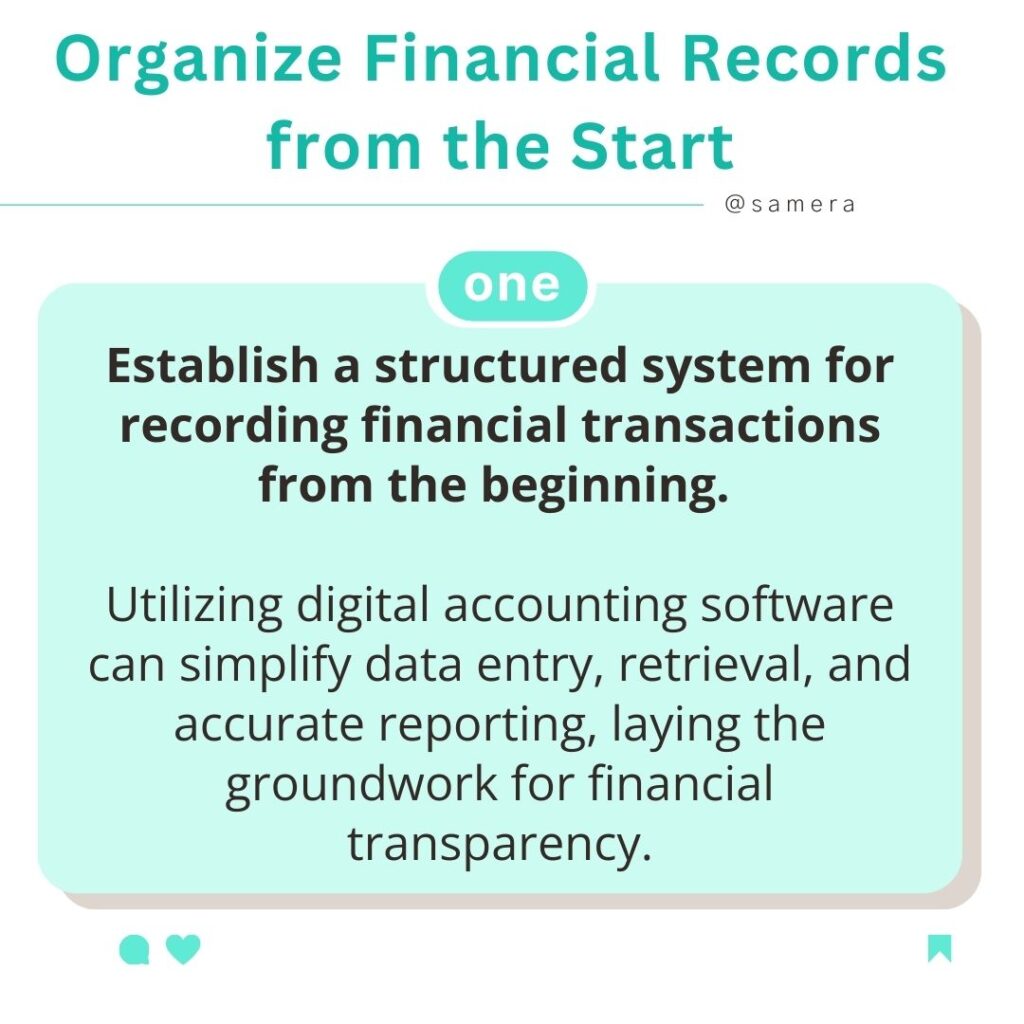
2. Separate Business and Personal Finances
A common pitfall that many small business owners fall into is commingling personal and business finances. This mixing of funds can lead to headaches during tax season and obscure insights into your business’s financial health. Combat this challenge by opening dedicated bank accounts for your business.
Segregating business and personal transactions not only facilitates clean record-keeping but also streamlines expense tracking and budgeting. This clear demarcation strengthens your financial oversight and helps prevent potential financial entanglements.

3. Regularly Reconcile Bank Statements
Reconciliation is the unsung hero of meticulous bookkeeping. Regularly comparing your recorded transactions with bank statements ensures accuracy and detects any discrepancies that might have slipped through the cracks. Many accounting software platforms offer features that automatically sync with your bank accounts, categorize transactions, and generate reports. This not only reduces manual data entry but also minimizes the potential for human error.
Rather than letting documents accumulate haphazardly, schedule regular intervals for entering financial data. This could be daily, weekly, or monthly, depending on the volume of transactions your business experiences. Consistent data entry not only prevents overwhelm but also ensures that you’re working with up-to-date information. This practice safeguards against errors, unauthorized transactions, or even potential fraud. By consistently reconciling bank statements, you maintain financial integrity and can confidently base critical decisions on precise and reliable data.
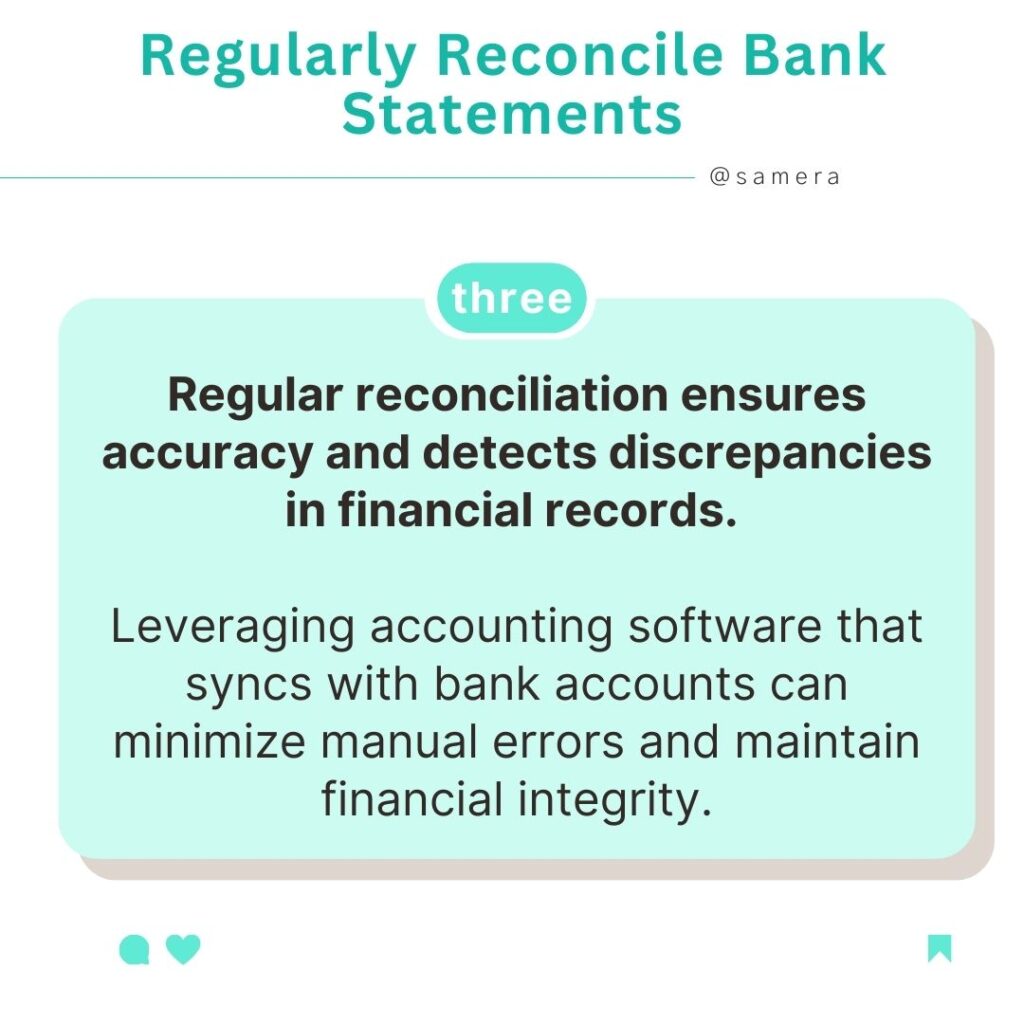
Click here to read our article on how accounting outsourcing firms can attract and retain to talent.
Did You Know?
- 83% of small businesses will maintain or increase their spending on outsourced business services in 2023. (Source: Clutch)
- It is projected that the revenue of accounting, bookkeeping and auditing activities, tax consultancy in the United Kingdom will amount to approximately 39.45 billion U.S. Dollars by 2025 (Source: Statista)
- Roughly 20% of small businesses do not survive beyond their initial two years, frequently because of financial mismanagement. (Source: Investopedia)
4. Track Expenses Religiously
Small expenses can add up quickly and significantly impact your bottom line. To maintain a firm grip on your financial outflows, make it a rule to track every expense meticulously. Implement a clear categorization system that aligns with your business’s needs, and ensure every receipt is recorded.
Be proactive in adapting your organization systems to accommodate this growth. This might involve revisiting your chart of accounts, expanding your filing system, or upgrading your accounting software to handle larger volumes of data. This granular approach to expense tracking not only aids in budgeting but also maximizes tax deductions and ensures compliance with regulatory requirements.
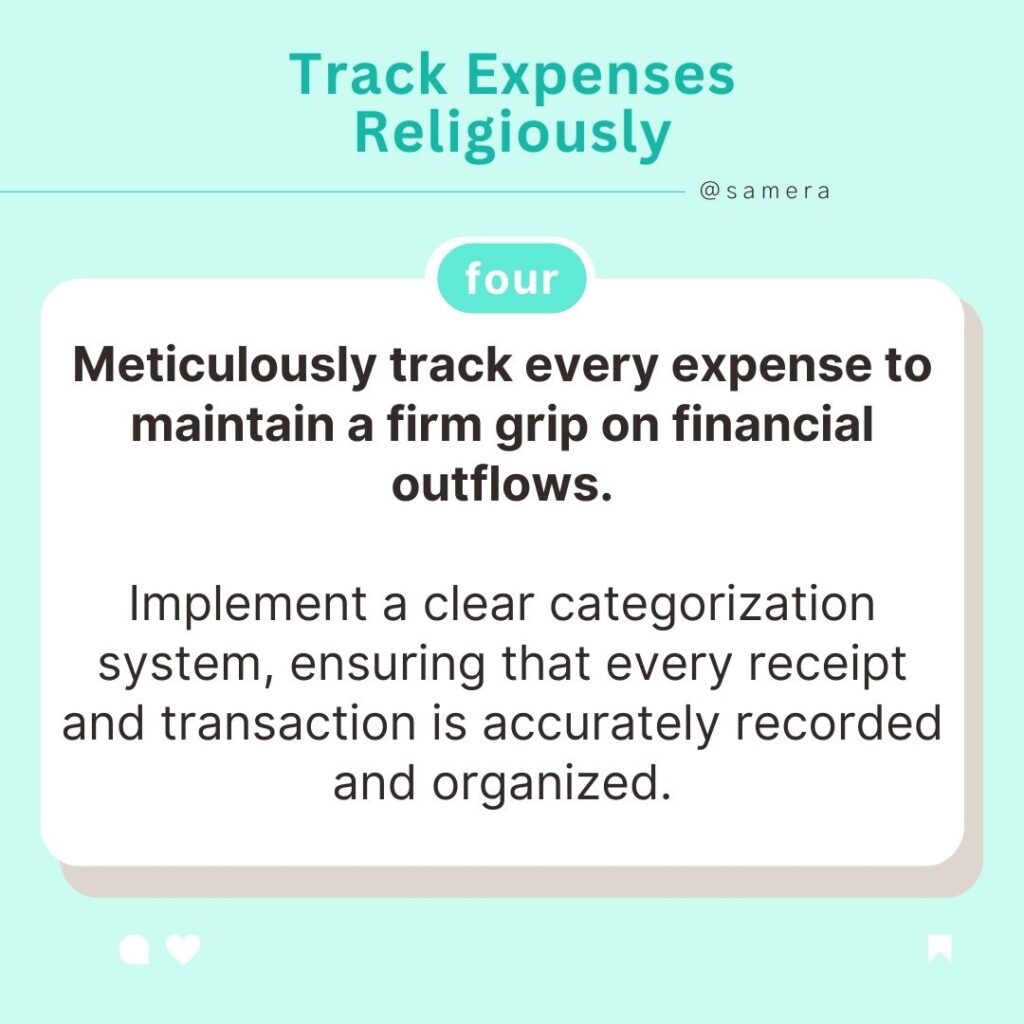
5. Embrace Technology for Invoicing
Invoicing is the lifeblood of revenue generation, and modern technology offers streamlined solutions to expedite this process. Embrace accounting software that enables you to create professional invoices and send them to clients promptly. These platforms often provide automated reminders for overdue payments and even offer online payment options, reducing the friction associated with collecting funds.
Leverage the power of automation to streamline your record-keeping efforts. Many accounting software platforms offer features that automatically sync with your bank accounts, categorize transactions, and generate reports. This not only reduces manual data entry but also minimizes the potential for human error. By utilizing technology to optimize your invoicing process, you enhance cash flow and minimize payment delays.
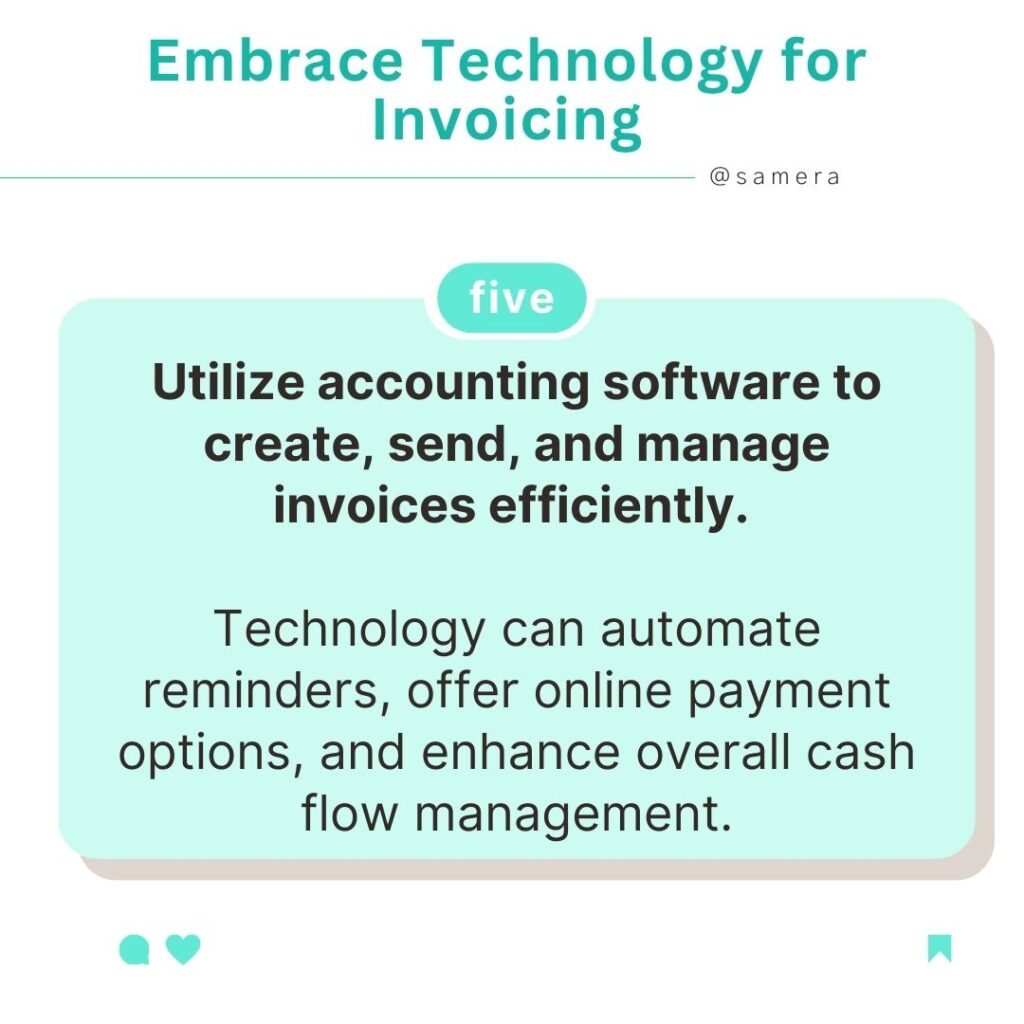
Click here to read our article on 4 ways AI is optimising Accounting & Bookkeeping.
6. Plan for Taxes Year-Round
Tax season is a challenging time for many small business owners, but with proactive tax planning, it can become a more manageable affair. Allocate a portion of your revenue to a designated tax fund throughout the year to prevent a last-minute scramble for funds. The foundation of effective tax planning is accurate and comprehensive financial records. This includes documenting income, expenses, deductions, and credits. A mere 17% of small businesses employ an asset management system capable of facilitating audits 3.
If your business generates income that isn’t subject to tax withholding, such as self-employment income, you may need to pay quarterly estimated taxes. Calculating and remitting these payments on time helps you avoid penalties and spreads your tax liability throughout the year. Stay informed about evolving tax regulations and enlist the guidance of a tax professional to ensure that your business maximizes available deductions while remaining compliant. By making tax planning a year-round practice, you alleviate the stress of tax season and pave the way for smoother financial operations.

7. Regularly Review Financial Reports
Financial reports offer a panoramic view of your business’s financial health, making regular review a crucial practice. Analyze profit and loss statements, balance sheets, and cash flow reports to identify trends, opportunities, and areas that require attention. These reports serve as a compass, guiding your business strategy and helping you adapt to changing circumstances. By consistently evaluating your financial performance, you make informed decisions that lead to increased profitability and overall business growth.
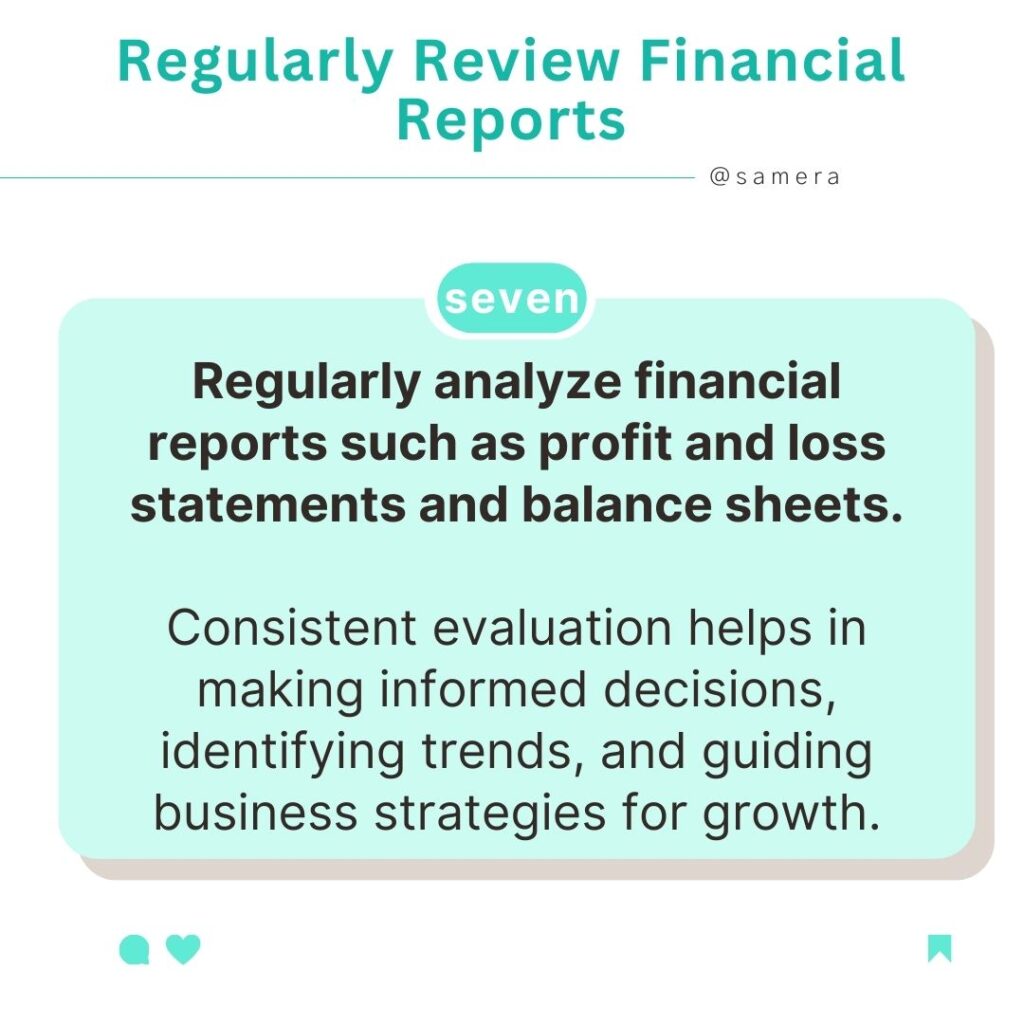
Click here to read our article on predictive analysis and accounting outsourcing services
Conclusion
The art of effective bookkeeping is an instrumental skill for small business owners. These seven tips not only unravel the intricacies of financial management but also equip you to steer your business towards success. The benefits ripple beyond accurate bookkeeping, extending to optimized cash flow, stress-free audits, and the confidence to make informed financial decisions.
From meticulous organization to leveraging technology, these strategies amplify your financial clarity and empower you to make informed decisions that shape the trajectory of your small business. Through dedication to precise record-keeping, proactive tax planning, and regular financial analysis, you unlock the potential for financial stability and prosperity.
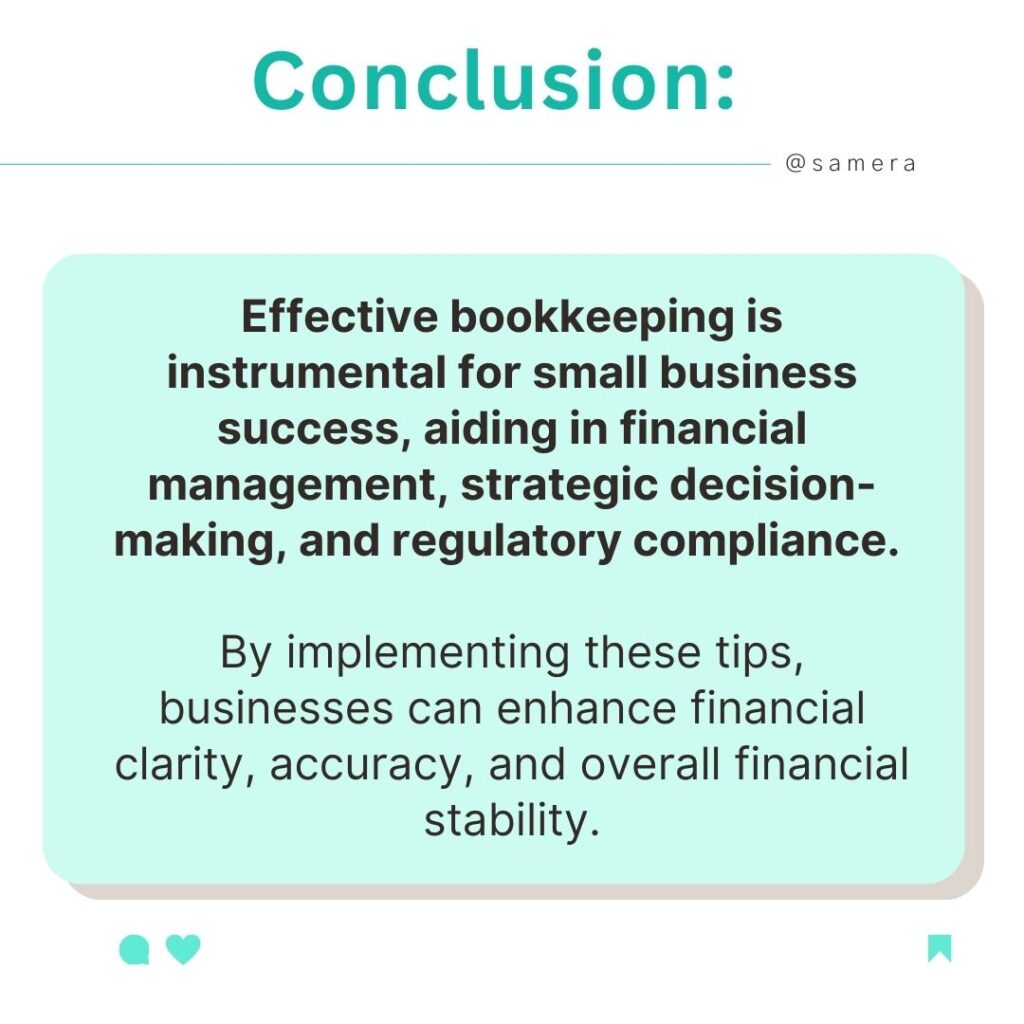

Expert Opinion
“There is really no excuse not to be getting the bookkeeping done in your business. The cloud, resource availability overseas, and technology can help you achieve this and ensure you present a well presented set of books for anyone to view. This investment will save you time, money and most of all lighten your load and reduce the headaches. Get the bookkeeping done in your business if you really want to grow your business – no excuses.”
Arun Mehra FCA
Samera Group CEO


